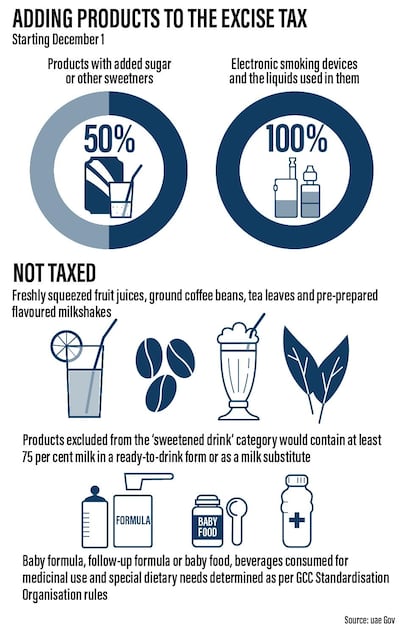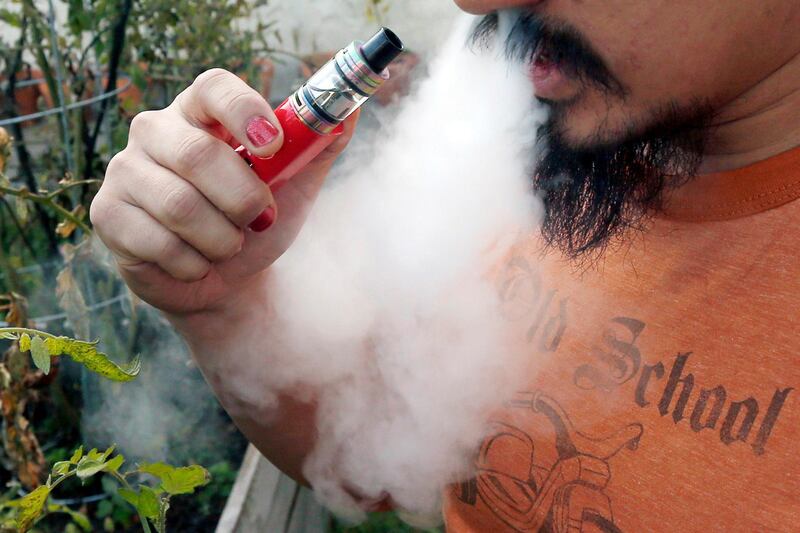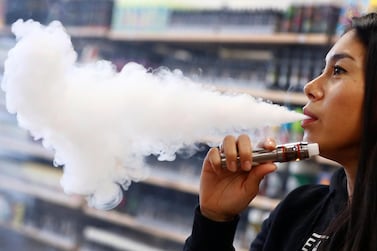UAE authorities have warned businesses to register e-cigarettes as well as sugary drinks manufactured in the country ahead of an expanded 'sin tax'.
Numerous goods, including vaping products and tobacco refills, will be subject to the new 100 per cent tax from December this year.
Companies which fail to register risk paying heavy fines or having their shipments into the Emirates delayed.
First time offenders could be charged as much as Dh5,000 from December 1, while repeat culprits face even higher penalties of Dh20,000.
“As we are getting close to December, we are passing on the message to encourage producers, importers and companies that deal with new excisable products to register,” said Khalid Al Bustani, director general of the Federal Tax Authority (FTA).
“There could be delays in import into the UAE and penalties if they do not comply with the excise tax rules. They should not leave it to the last minute to register.”
In August this year, the UAE Cabinet announced a new excise tax on e-cigarettes, vaping products and tobacco refills in an effort to reduce demand for “harmful goods”.
Officials also said they planned to expand an existing 50 per cent tax on fizzy drinks, first introduced two years ago, to include non-carbonated beverages with high levels of sugar and caffeine.
Mr Al Bustani warned it was not just producers and importers who needed to register to pay the excise tax prior to the deadline.
He said businesses expecting to sell applicable goods already in the country would also need to register the products prior to December 1.
On Tuesday, the FTA said 782 companies across the country had already registered under the new rules, with this figure expected to rise.
Officials highlighted the exacting requirements of the new system, emphasising any ready-to-drink beverage, as well as concentrates, powders, gels and extracts that can be converted into a sweetened drink, would be taxed.
They also confirmed any company which believed their imported drink was tax exempt would require a laboratory report confirming its lack of sugar content from a government facility.
From March next year, shisha products and packets of e-cigarettes will be colour coded to prove the new tax has been paid.
The move mimics an existing system applied to cigarettes sold in the UAE, with packets that have paid tax marked with red stickers.

“Our job is to ensure that every excisable item that is imported, produced or warehoused is covered and the tax is paid,” said Mr Al Bustani.
“This [the sin tax] is to eliminate bad habits in the consumption of such products that have a negative impact on the health of UAE residents.”
Doctors in the UAE backed the tax, saying they hoped it would encourage healthier habits.
Dr Alaadin Mustafa, head of internal medicine at Al Zahra Hospital in Dubai, said the levy should also help take some of the pressure off the country’s healthcare budget.
"In the past decade, people having been increasingly leading unhealthy lifestyles which resulted in increase of diabetes, obesity, lung diseases such as asthma or cancer," he told The National in August.
“Increasing taxes on these substances should, hopefully, raise people’s awareness towards the dangers of their overuse.”







